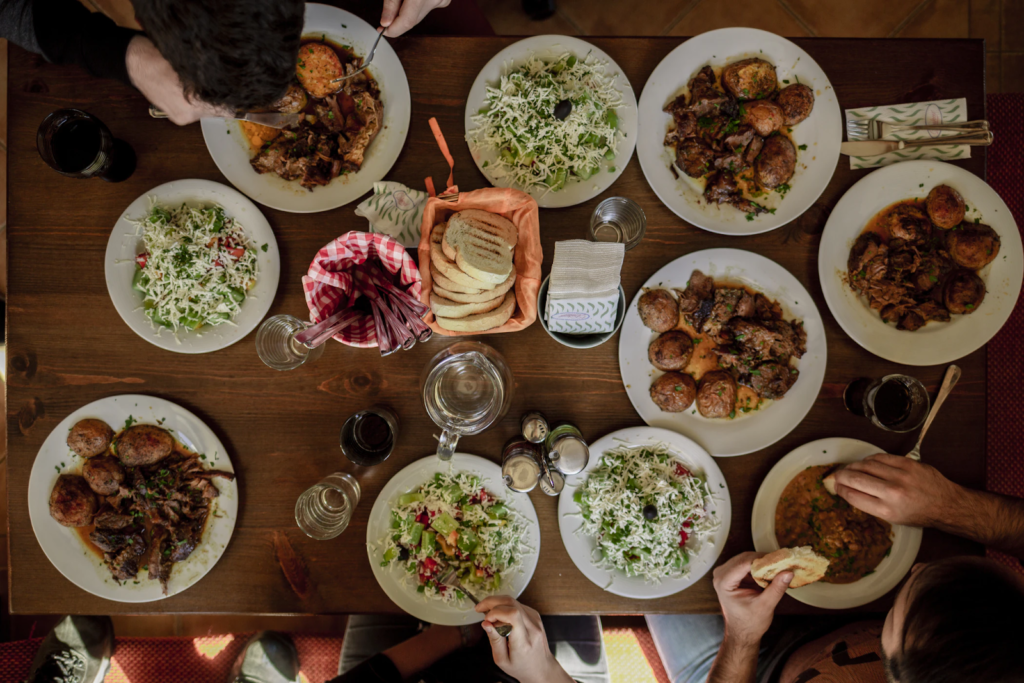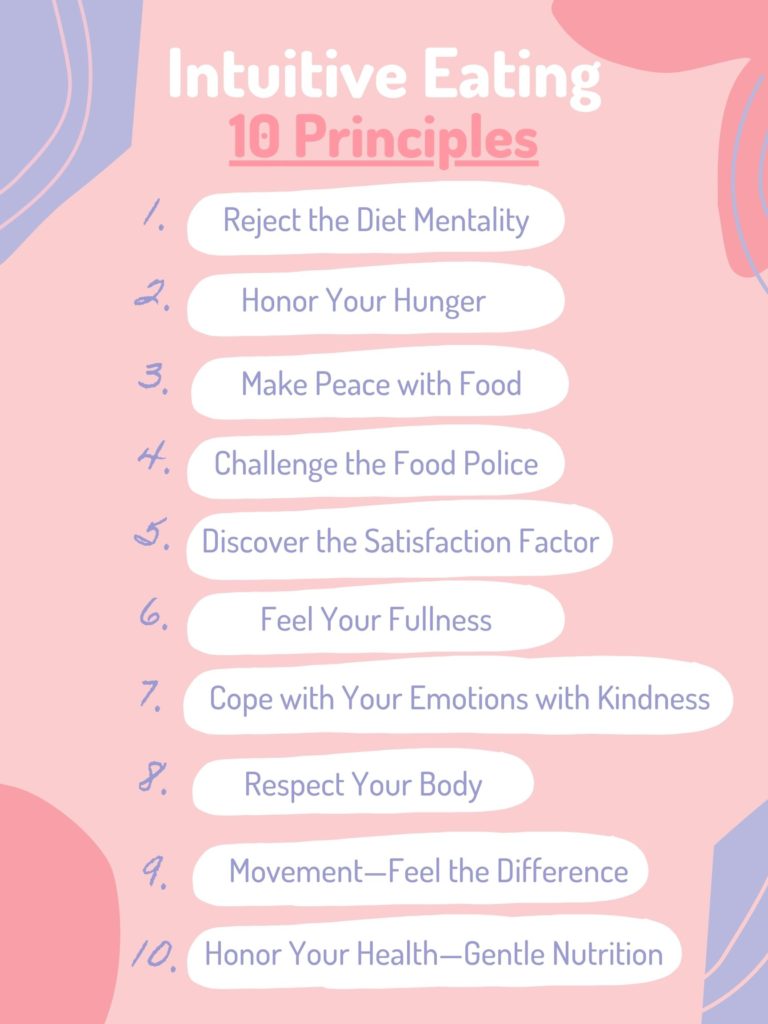Intuitive eating is a lifestyle that rejects all food rules and aims to repair body image issues caused by dieting

For many women, keeping up with shifting beauty standards, body dysmorphia and diet culture is exhausting. Society’s ever-evolving image of the ideal body encourages people to change themselves and leaves women hyper-aware of their bodies at a young age. As a result, people often find themselves turning to a restrictive diet.
Food rules like, “don’t eat after 7 p.m.” or “cut out carbs” are commonly found in the descriptions of different diets. New food rules are introduced every time a diet makes its way to the forefront of popular media, claiming to have the solution to all weight-related problems. As more and more food rules enter our lives, the way we think about eating becomes increasingly complicated.
In recent years, a lifestyle that advocates call “anti-diet” has been gaining traction: intuitive eating. Intuitive eating rejects all food rules and aims to repair people’s relationship with food and their bodies.
“The goal is to reject the diet mentality, honour your hunger, and make peace with food,” said Toronto-based registered dietitian Trista Chan, who works with clients on intuitive eating practices.
“Oftentimes, after years and years of restrictive dieting, most people are very out of touch with their internal bodies’ cues.” She said this can cause people to have anxiety around food and to lose the natural satisfaction that comes from eating. “(Intuitive eating is) really about tuning out all that outside noise … and trying to place your body as its own expert.”
Intuitive eating has 10 guiding principles — like “discover the satisfaction factor” and “feel your fullness” — which work to help people rediscover the carefree and innate joy of eating.
Simply put, it is done by eating what you want when you are hungry and stopping when you are full.

Listening to your body’s hunger cues sounds simple enough, but putting it into practice can be difficult to do. This is because diet culture’s prominence in our lives has led many of us to fall out of trust with our bodies, said Stephanie Cassin, a Ryerson psychology professor who specializes in disordered eating and body image. Intuitive eating aims to challenge the eating behaviours many people have adapted as a result of diet culture.
When Adrianna Chiofalo first saw posts about intuitive eating pop up on her social media timeline last year, she was intrigued. The third-year nursing student had been meticulously calorie-tracking for a year and was feeling a disconnect in her relationship with food.
Chiofalo is the student lead of The Body Project, a body acceptance advocacy program at Ryerson. She said getting started with intuitive eating was a challenge because her restrictive eating had caused her to lose her hunger and satiety cues.
“It was a bit freaky to be like, ‘How did I lose track of something that’s so innate? Something that you’re just born with?’ I (was so) brainwashed that I lost the attention towards those signals completely,” she said.
Falling out of touch with these cues can be caused by the fact that binging and restricting are normalized as a part of dieting, said Cassin. She said that some processed foods are created with the intent of being binged on; to make the person eating them feel a loss of control.
“When you see commercials (saying), ‘You can’t just eat one’ you know there’s some truth to that. Some of them actually have been produced or manufactured to make them really difficult to resist,” she said.
This loss of control around food can have a harmful impact on someone’s body image. In Canada, approximately 85 per cent of women and girls are unhappy with the way they look, according to a study by Canadian Women’s Health Network. Often, this can lead someone to pursue quick weight loss through chronic dieting, said Cassin.
“If you’re feeling negative about body image, it’s hard to convince yourself to just adopt healthy lifestyle changes for the long haul (that are) actually going to make you feel better. People typically want to go for the quick results,” she said.
This leads to a “vicious cycle” of trying new fad diets that actually cause more weight gain over time and worsen body image, said Cassin. Psychologically, it’s more difficult to adjust to the weight fluctuations that come from yo-yo dieting than to eat in a way that nourishes your body and maintain a steady weight, she said — even if it’s a bit higher than what your ideal would be.
Research shows there is a clear link between dieting and eating disorders. A study done by the National Eating Disorders Association found that 20 to 25 per cent of pathological dieters — people who follow extreme food or calorie restrictions — develop eating disorders.
For many people, Cassin said eating behaviours are a way of regulating emotions like depression, anxiety, or loneliness — all things people have been experiencing during the pandemic.
People overeat or restrict to feel a sense of control in a situation where they might otherwise feel out of control. Intuitive eating aims to relinquish this need for control by removing the power placed on food and calories.
When starting her journey of intuitive eating, Chiofalo said it was difficult to let go of the “computerized structure of eating” that she had been following with calorie-tracking. After a year of intuitive eating, she said her body weight has stayed mostly consistent, but her mindset has changed.
“I was constantly thinking about food and trying to fit as much food as possible into the target of calories. Now with intuitive eating, I go with the flow. I’ve learned to just kind of accept my body as it is, and eat what I want,” she said.
Intuitive eating isn’t about quick physical transformations. In fact, it separates itself from the weight loss mentality entirely and aligns with the Health At Every Size (HAES) movement, according to Sarah Berneche, a nutritionist and intuitive eating counsellor based in Toronto.
The guiding principles of HAES are that you don’t have to wait to be thin to pursue health; anyone can pursue it at any time and at any size.
“It’s about eating foods that feel good to you, as opposed to trying to restrict food. It’s about moving for the joy of it, as opposed to trying to punish yourself through movement,” said Berneche. “And it’s also acknowledging that we all have different degrees of privilege and that’s going to inform our ability to pursue health.”
HAES and the practice of intuitive eating make it clear that health is not always a personal choice and can be influenced by social determinants. There are many barriers in place that can make it harder for people to lead healthy lifestyles, such as someone’s income level and physical proximity to accessible healthy foods.
Although intuitive eating may not yield the physical changes that some people are after, advocates say its physical and mental benefits are healthier than most weight loss methods. Along with providing weight stability, there are also many psychological benefits to intuitive eating, said Cassin. One of them is a reduced feeling of loss of control.
“The research shows in a pretty compelling way that it’s actually the experience of loss of control that creates more of a feeling of psychological distress than the amount of food that people eat during a binge,” said Cassin. Intuitive eating brings people a neutral relationship with food, which she said can help improve mood and anxiety.
One goal of intuitive eating is to separate weight from self-worth, by pushing back against weight-related stigmas perpetuated by the diet industry.
“Diet culture is all about this idea (that) everybody should be walking through the world in this thin body and anybody that doesn’t meet that sociocultural ideal (is) lazy, or there’s something wrong with them and that’s not true at all,” said Cassin.
“Intuitive eating recognizes that people’s bodies come in different sizes, shapes and weights. And that’s okay. Body diversity is okay.”
It’s not hard to trace people’s complex relationship with food and eating habits back to society’s demanding beauty standards. If mainstream media celebrated more diverse bodies, we would struggle less with food, said Chan.
Listening to your body and rediscovering its needs is a process that starts with self-compassion. Chan said in order to rebuild a healthy outlook on eating, it’s important to remove “good” or “bad” labels from food and think of all food as neutral. Then, make it a habit to check in with your body before and after meals, to assess how hungry or full you are, and to take note of what your mood is.
Intuitive eating relies on innate hunger and satiety signals that humans were born with, but that get lost overtime as a result of dieting and disordered eating. Principles such as “honour your hunger” and “discover the satisfaction factor” refocus eating on what it should be: a natural, fun, vital part of life.
“In an ideal world, we’d all be intuitive eaters and I think we all have that within us,” said Chan.
